 While reading through the wonderful, new collection of essays and talks given at the Oxford C.S. Lewis Society, C.S. Lewis and His Circle, edited by Roger White (Oxford University Press; $29.95), I was struck by the remarkably able thinkers and charming characters who gathered with or later stood on the shoulders of the Inklings and their tribe. There are chapters – essays and memoirs — by those who were friends of Lewis, or who are particularly engaged in Lewis studies, from Walter Hooper and George Sayer and Owen Barfield, to lesser known individuals such as the priest who married Lewis & Joy Davidman, or the recent scholar who unlocked new ways to understand Narnia, Michael Ward, and so many others. Are there such people who are known today, so well read and aware of the spirit of the age, exceptionally logical and rigorous in classic scholarship but also passionate about the heart, the imagination?
While reading through the wonderful, new collection of essays and talks given at the Oxford C.S. Lewis Society, C.S. Lewis and His Circle, edited by Roger White (Oxford University Press; $29.95), I was struck by the remarkably able thinkers and charming characters who gathered with or later stood on the shoulders of the Inklings and their tribe. There are chapters – essays and memoirs — by those who were friends of Lewis, or who are particularly engaged in Lewis studies, from Walter Hooper and George Sayer and Owen Barfield, to lesser known individuals such as the priest who married Lewis & Joy Davidman, or the recent scholar who unlocked new ways to understand Narnia, Michael Ward, and so many others. Are there such people who are known today, so well read and aware of the spirit of the age, exceptionally logical and rigorous in classic scholarship but also passionate about the heart, the imagination?
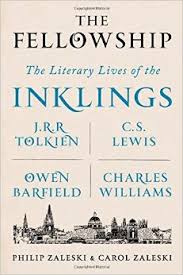 Another new book out just last week that we are proud to stock is by Philip & Carol Zaleski and looks at the literary lives of Lewis, Tolkien, Barfield, and Charles Williams and is simply called The Fellowship (FSG; $35.00). There may not be a particularly close-knit network of literary-minded, pint-drinking, famous Christian friends like there was with the Inklings and their fellowship but there may be those who deserve (almost anyway) to be compared to the Oxford don and his pals.
Another new book out just last week that we are proud to stock is by Philip & Carol Zaleski and looks at the literary lives of Lewis, Tolkien, Barfield, and Charles Williams and is simply called The Fellowship (FSG; $35.00). There may not be a particularly close-knit network of literary-minded, pint-drinking, famous Christian friends like there was with the Inklings and their fellowship but there may be those who deserve (almost anyway) to be compared to the Oxford don and his pals.
Although for the Lewis mantel to be bestowed properly, the recipient would have to be a novelist and poet, of course, but in terms of eloquence, skilled apologetics and clarity of a Christian vision of life at the beginning of the 21st century, two (among others, I admit) prolific writers come to mind. Both are exceptional, premier communicators and serious teachers. Both stand in the tradition of “mere Christianity” (although may be more rigorously evangelical then Lewis himself) and are generous, gracious, and yet gritty, realistic thinkers.
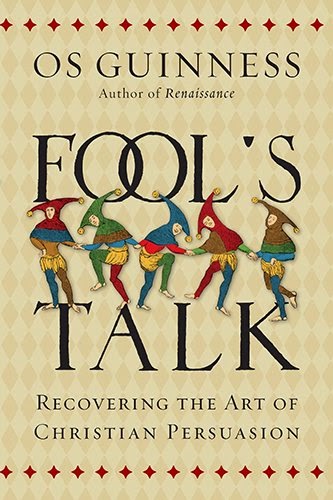 Dr. Os Guinness, himself trained at Oxford (and an Irishman, like Lewis, who was, of course born in Belfast), owes much to Lewis, as he explains in his forthcoming book, Fool’s Talk: Recovering the Art of Christian Persuasion (IVP; $22.00.) Some of us have been waiting a lifetime for Os to do such a major work on Christian proclamation, apologetics and persuasion, knowing of his keen insight about and his deep desire for a culture of civility which permits a robust presentation of the gospel that can be persuasive to those who are informed by the secularizing forces of modernity. That book will be released soon, and I will do a more thorough explanation of it in an upcoming BookNotes column. (We are taking pre-orders now, and would be happy to send it as soon as it arrives if you order now.) The wonderfully articulate, silver-haired Ravi Zacharias says Fool’s Talk is a “landmark” book, and Guinness himself explains that he has been wanting to write this book for nearly 40 years, but was determined to wait until he felt he had adequately thought through the complexities of the issues involved, the nature of the secular mind, and had actually experienced doing evangelism and apologetics, with serious experience in engaging in conversations of consequences with those who were skeptics. Indeed, this is a book, drawing (in part) on Lewis himself, which will be considered not only magisterial, but important and lasting. I can’t wait to tell you more about it, soon.
Dr. Os Guinness, himself trained at Oxford (and an Irishman, like Lewis, who was, of course born in Belfast), owes much to Lewis, as he explains in his forthcoming book, Fool’s Talk: Recovering the Art of Christian Persuasion (IVP; $22.00.) Some of us have been waiting a lifetime for Os to do such a major work on Christian proclamation, apologetics and persuasion, knowing of his keen insight about and his deep desire for a culture of civility which permits a robust presentation of the gospel that can be persuasive to those who are informed by the secularizing forces of modernity. That book will be released soon, and I will do a more thorough explanation of it in an upcoming BookNotes column. (We are taking pre-orders now, and would be happy to send it as soon as it arrives if you order now.) The wonderfully articulate, silver-haired Ravi Zacharias says Fool’s Talk is a “landmark” book, and Guinness himself explains that he has been wanting to write this book for nearly 40 years, but was determined to wait until he felt he had adequately thought through the complexities of the issues involved, the nature of the secular mind, and had actually experienced doing evangelism and apologetics, with serious experience in engaging in conversations of consequences with those who were skeptics. Indeed, this is a book, drawing (in part) on Lewis himself, which will be considered not only magisterial, but important and lasting. I can’t wait to tell you more about it, soon.
A second author who quickly comes to mind when thinking about who the “C.S. Lewis of today” might be is Rev. Dr. Timothy Keller, founding pastor of Redeemer Presbyterian Church in Manhattan. Interestingly, the New York Times itself suggested  this about Keller, upon the release of his 2008 book Reason for God: Believe in an Age of Skepticism (Riverhead; $16.00) and subsequent DVD curriculum by the same name. That his work is published by the prestigious Riverhead, part of the Putnam Publishing Group, is itself impressive and indicates that Keller’s work is taken seriously. Even those who do not find themselves in his particular Reformed camp acknowledge that he is an incisive thinker, an effective preacher and sophisticated church leader, and a very engaging, thoughtful writer.
this about Keller, upon the release of his 2008 book Reason for God: Believe in an Age of Skepticism (Riverhead; $16.00) and subsequent DVD curriculum by the same name. That his work is published by the prestigious Riverhead, part of the Putnam Publishing Group, is itself impressive and indicates that Keller’s work is taken seriously. Even those who do not find themselves in his particular Reformed camp acknowledge that he is an incisive thinker, an effective preacher and sophisticated church leader, and a very engaging, thoughtful writer.
That his first book was about ministry to the poor (called Ministries of Mercy: The Call to the Jericho Road) and that he brings in to New York speakers such as N.T. Wright or co-authors books about the work world with business leaders such as Katherine Leary Alsdorf (Every Good Endeavor: Connecting Your Work to God’s Work) or has tackled the philosophical and pastoral questions about evil in Walking with God Through Pain and Suffering shows that he is a writer who is interested in real-world faith and whole-life discipleship. His big book about doing culturally-engaged church ministry is very good
Road) and that he brings in to New York speakers such as N.T. Wright or co-authors books about the work world with business leaders such as Katherine Leary Alsdorf (Every Good Endeavor: Connecting Your Work to God’s Work) or has tackled the philosophical and pastoral questions about evil in Walking with God Through Pain and Suffering shows that he is a writer who is interested in real-world faith and whole-life discipleship. His big book about doing culturally-engaged church ministry is very good
— not perfect, of course, but maybe the best book of its kind that I know — and
you really should know it, especially if you are a congregational leader; it is called Center Church: Doing Balanced Gospel-Centered Ministry in Your City. Counterfeit Gods is a potent critique of the idols of money, sex, and power, and Generous Justice is subtitled How God’s Grace Makes Us Just. You can see why I like this guy.
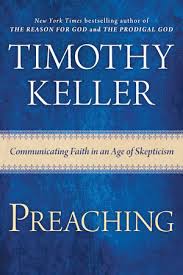 Timothy Keller’s brand new book Preaching: Communicating Faith in an Age of Skepticism (Viking; $19.95) is a somewhat smaller, almost compact hardback — in the shape and size of his best-selling Prodigal God, Encounters with Jesus, Generous Justice and Counterfeit Gods. But do not be surprised — it is a dense, serious book, packed with insight, mature writing, even demanding at times. There is fascinating history, good theology and astute cultural analysis woven together inviting those of us who talk about the gospel to do it well and to be effective. The endnotes are truly exceptional (and include what is nearly a full appendix or two with detailed suggestions for preaching plans and sermon prep, offered at the end in these extensive extra notes.) The book is very important, and I think BookNotes readers will be wise to consider it.
Timothy Keller’s brand new book Preaching: Communicating Faith in an Age of Skepticism (Viking; $19.95) is a somewhat smaller, almost compact hardback — in the shape and size of his best-selling Prodigal God, Encounters with Jesus, Generous Justice and Counterfeit Gods. But do not be surprised — it is a dense, serious book, packed with insight, mature writing, even demanding at times. There is fascinating history, good theology and astute cultural analysis woven together inviting those of us who talk about the gospel to do it well and to be effective. The endnotes are truly exceptional (and include what is nearly a full appendix or two with detailed suggestions for preaching plans and sermon prep, offered at the end in these extensive extra notes.) The book is very important, and I think BookNotes readers will be wise to consider it.
Here is the first thing you should realize: although the book is entitled Preaching the subtitle explains much of the content (and in this it will dovetail nicely with the forthcoming Os Guinness book on persuasion, which is heavy on analysis of the secular landscape and cultural habits of contemporary people.) In other words, the book is useful for many of us who want to understand our times, to be effective in our Christian witness, to be astute about the shape of our unfolding discipleship.
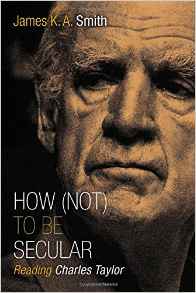 It might not surprise you to hear that some of this book draws on the truly landmark book A Secular Age by the Catholic philosopher Charles Taylor. Keller has been telling people about this book for quite some time, and, in fact, gave a very impressive endorsement for the back of James K.A. Smith’s introduction to Taylor entitled How (Not) To Be Secular: Reading Charles Taylor (Eerdmans; $16.00.) Regarding Smith’s book, Keller writes,
It might not surprise you to hear that some of this book draws on the truly landmark book A Secular Age by the Catholic philosopher Charles Taylor. Keller has been telling people about this book for quite some time, and, in fact, gave a very impressive endorsement for the back of James K.A. Smith’s introduction to Taylor entitled How (Not) To Be Secular: Reading Charles Taylor (Eerdmans; $16.00.) Regarding Smith’s book, Keller writes,
Charles Taylor’s crucial book on our secular age is inaccessible for most people, including the church leaders who desperately need to learn from its insight. Jamie Smith’s book is the solution to this problem. As a gateway into Taylor’s thought, this volume (if read widely) could have a major impact on the level of theological leadership that our contemporary church is getting. It could also have a great effect on the quality of our communication and preaching. I highly recommend this book.
 And so, in his own new book, Preaching, Keller has a chapter called “Preaching and the (Late) Modern Mind.” It starts, curiously, with a quote by P.T. Forsyth’s 1907 book called Positive Preaching and the Modern Mind, which, Keller suggest, is still remarkably up to date. (I first learned of Forsyth, by the way, from Eugene Peterson, who remains a fan of his books on preaching and on prayer.) Here’s Keller: “By identifying one of the main narratives of modernity and laying out a way to deconstruct it from within, Forsyth was a pioneer and pathfinder.” Later in the chapter, Keller draws significantly on Taylor. I would suggest that the few middle chapters (also “Preaching Christ to the Culture”) are must-reads for anyone who is interested in the “Christ and culture” conversations, thinking faithfully about art or work or civil society, the missional vision, and the like. If you found Smith’s book – which we’ve promoted widely – to be a bit challenging, Keller’s synopsis may be really useful for you.
And so, in his own new book, Preaching, Keller has a chapter called “Preaching and the (Late) Modern Mind.” It starts, curiously, with a quote by P.T. Forsyth’s 1907 book called Positive Preaching and the Modern Mind, which, Keller suggest, is still remarkably up to date. (I first learned of Forsyth, by the way, from Eugene Peterson, who remains a fan of his books on preaching and on prayer.) Here’s Keller: “By identifying one of the main narratives of modernity and laying out a way to deconstruct it from within, Forsyth was a pioneer and pathfinder.” Later in the chapter, Keller draws significantly on Taylor. I would suggest that the few middle chapters (also “Preaching Christ to the Culture”) are must-reads for anyone who is interested in the “Christ and culture” conversations, thinking faithfully about art or work or civil society, the missional vision, and the like. If you found Smith’s book – which we’ve promoted widely – to be a bit challenging, Keller’s synopsis may be really useful for you.
And, just to show that this isn’t just for heady intellectuals who read Charles Taylor or Jamie Smith, Keller quotes the nearly iconic song “Let It Go” from Frozen. If you want to understand the narrative of the autonomous self that pervades even the children’s songs of our age, you just have to read those pages. We all have to grapple with this stuff – the air we breath, the social context and location of our churches and those who listen to us preach and teach and speak. If you not only want to see “between the lines” and just “below the surface” of our cultural moment and societal ethos, but want to know how to share some wise Christian counsel to re-shape the souls of those informed by the “hidden belief web of secularity,” then this is going to be exceptionally helpful for you. Which is to say, if you are any kind of Christian leader, teacher, writer, blogger, public thinker, politician, artist, media person, campus minister, youth leader, parent, Christian educator, spiritual director, or anyone with influence, you really should know this material and the moves it makes to help us speak well into the times. Again, the subtitle is crucial: Communicating Faith in an Age of Skepticism.
I started off with this — you should buy this Keller book if you care about the times, if you want to be astute in your engagement with the world around you, if you want to understand your peers, co-workers, parishioners or the media pundits that influence public opinion. In my chapter in Serious Times: Bold Ideas for the Rest of Your Life I preached on 1 Chronicles 12:32, about being “sons and daughters of Issachar” who “understood the times and knew what God’s people should do.” This is a book about the times and how to speak wisely to those moderns who are shaped by the world in which they necessarily live. I think it is Issacharian.
But I could have started where Keller himself does, with his own apologetic for the book. His first two short chapters – a good introduction and prologue – explain that the Bible itself uses the language of preaching, speaking, teaching, in rather broad ways. That is, all of us are called to steward the language we use, and many of us are to speak wisely and well about the gospel as we inform others, in church, in small groups, or in our own circles of influence. Of course, a book called Preaching is certainly aimed at those who preach sermons to those gathered for worship, but he explains that there are other “levels” of preaching that some of us do.
He writes,
Every Christian needs to understand the message of the Bible well enough to explain and apply it to other Christians and to his neighbors in informal and personal settings. [He calls this level 1.] But there are many ways to do the ministry of the Word at level 2 that take more preparation and presentation skills yet do not consist of delivering sermons (level 3.) Level 2 today may include writing, blogging, teaching classes and small groups, mentoring, moderating open discussion forums on issues of faith, and so on.
This book aims to be a resource for all those who communicate their Christian faith in any way, particularly at levels 2 and 3.
I don’t mean to overstate this tangent, but I think his introductory framework is insightful. He shows that there are various sorts of ways to proclaim the Word and that we will always require “a host of varied forms of Word ministry, the specific public ministry of preaching is irreplaceable.” He quotes a the Australian theologian Peter Adam saying our church’s gospel ministry should be “pulpit-centered, but not pulpit restricted.” Some of us may quibble about “pulpit-centered” but his point about the centrality of the Scriptures is certainly a needed one, as even our most sacramental church leaders are insisting.
Keller summarizes the interplay of various sorts of Bible reading groups and learning communities and teaching ministries:
So there are three levels of Word ministry, and they are all crucial and support one another. The public preaching of Christ in the Christian assembly (level 3) is a unique way that God speaks to and builds up people, and it sets up the more organic forms of Word ministry at levels 1 and 2. Likewise, the skilled and faithful communication at levels 1 and 2 prepares people to be receptive to preaching. This volume will speak to all those who are wrestling with how to communicate life-changing biblical truth to people at any level in an increasingly skeptical age. It will also serve as an introduction and foundation for working preachers and teachers in particular.
There are very important things in this short book that I wish every preacher, teacher, and communicator would consider. I suspect it won’t be as universally agreed upon as the good Dr. Keller will wish, but even if you don’t agree fully with every conclusion, he is certainly right to hold up these major, major conversations. Agree or not, this is splendid stuff for preachers to consider.
For instance, one chapter is called “Preaching the Gospel Every Time.” This does not mean that every sermon must have some Billy Graham -type altar call or be essentially evangelistic, but it does mean that Christ must be lifted up, that grace must be clear, that the sermon must resist “legalism” or “moralism” but must be clear about the good news. He reminds us of the dangers of preaching even a sermon on Christ that misses the gospel, or a sermon on the core truths of the gospel without proclaiming Christ. Fascinating! His insistence that the gospel is the core of the canonical message, that the whole narrative of the Bible coheres, is a major theme here, and oh how I wish preachers would review it regularly.
“Preaching Christ From All of Scripture” is another related chapter and it will not surprise those who know that Keller studied at Westminster Theological Seminary in the 70s under the great Edmund 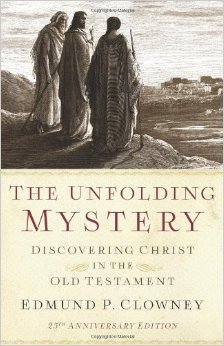 Clowney. (Dr. Clowney’s The Unfolding Mystery: Discovering Christ in the Old Testament (P&R; $12.99) is still a standard text in this movement.) Regardless of genre, Keller explains, one must see how each part of the Bible points toward Christ in particular ways. Also, through “every theme of the Bible” and in “every major image of the Bible.” On and on, this succinct chapter shows how this works and is itself worth the price of the book for anyone who reads the Bible, and certainly for anyone who teaches the Bible. There is some push back these days against this Christological hermeneutic, I realize, but, agree fully or not, this is sweet and fruitful stuff, I believe, and advice that most preachers, Sunday school teachers, youth leaders, camp counselors, campus ministers and Christian counselors of all sorts need to regularly recall. It is, after all, the method Jesus used to set on fire the hearts of those walking with him in the lovely passage about walking on the road to Emmaus.
Clowney. (Dr. Clowney’s The Unfolding Mystery: Discovering Christ in the Old Testament (P&R; $12.99) is still a standard text in this movement.) Regardless of genre, Keller explains, one must see how each part of the Bible points toward Christ in particular ways. Also, through “every theme of the Bible” and in “every major image of the Bible.” On and on, this succinct chapter shows how this works and is itself worth the price of the book for anyone who reads the Bible, and certainly for anyone who teaches the Bible. There is some push back these days against this Christological hermeneutic, I realize, but, agree fully or not, this is sweet and fruitful stuff, I believe, and advice that most preachers, Sunday school teachers, youth leaders, camp counselors, campus ministers and Christian counselors of all sorts need to regularly recall. It is, after all, the method Jesus used to set on fire the hearts of those walking with him in the lovely passage about walking on the road to Emmaus.
Despite this thoughtful and important Biblical content, I suppose one might say – if one is particularly well read in journals and books and blogs amongst certain circles – that this is increasingly commonplace and often said. Well, I believe this Christo-centric, gospel-centered view is not expressed this well or this clearly or this urgently, and commend it even for those who are familiar with this classic approach.
However, there is other teaching in this book that is nearly rare these days, and I am so grateful for Keller’s contribution. For instance, he has a chapter about “preaching to the heart” and as I am sure you would suppose, he is neither sentimental nor simplistic. He explains the importance of the affections, and invites us to preach and teach “affectionally.” While we don’t want to promote flat or dry preaching, of course, a preacher making clear his or her own heart-felt engagement with the truths of the text, for Keller, is not primarily about emotions. He reminds us,
Teachers and preachers of the Bible are often so focused on preparing and presenting their content that they don’t realize the degree to which people are not just listening to what they are saying but are also looking at who they are as they preach. People are examining motives without even being aware that they are doing it. They can sniff out if you are more concerned about looking good or sounding authoritative than you are about honoring God and loving them.
Get this: Keller proposes in Preaching that if preachers are overly concerned about their style and passion that “even people who are moved on one level by your performance will subconsciously resist it at another level, the same way many feel cynical at sentimental advertising even as they fight back tears.”
So, please realize, much of the book is about “preaching to the heart” and “preaching from the heart.”
It sometimes invites us to ponder our own faith formation, calling us to be – as in Nouwen’s famous phrase, perhaps, “wounded healers.” How are we living out the Kingdom vision in our own lives? In what way have we ourselves struggled to resist the idols of our own hearts? How are we living into Christ-likeness? He doesn’t push hard, but implies this. For instance, listen here as Keller suggests these themes, powerfully and provocatively:
Half this book is dedicated to preaching to the heart. You certainly understand by now that you cannot hope to do that unless you are consistently preaching from the heart. What you are calling people to experience you must be experiencing yourself. What the Holy Spirit is to do in the hearts of your listeners he will normally do first in and through you. You must be something like a clear glass through which people can see a broken but gospel-change soul in such a way that they want it for themselves.
Tim Keller insists that we must also preach and teach “imaginatively” (recall Lewis on this – rational and romantic, offering “reason and imagination.”) Keller himself uses good illustrations from the history of great preachers, and from Biblical stories themselves as he unpacks this important component to our witness. He writes about preaching “wonderously” and draws on Tolkien’s famous essay “On Fairy Stories.” I am sure you will enjoy this, and be challenged to live more wonderously, even as we proclaim the beauty and awe of God’s character and work in the world.
Later, Keller offers very practical ideas for sermon preparation, and I found these portions to be really interesting and surprisingly helpful. If you’ve been at this a long time, I suspect you’ll appreciate it. If you are a younger communicator or recently ordained preacher or new to the teaching ministry, these suggestions will save you time and energy and perhaps even embarrassment. Preaching: Communicating Faith… offers wise counsel, good ideas not often found even in standard homiletics books.
We have more than a hundred books on homiletics at our shop and I’ve read a number of them. There is much to be said about this perennial problem, how to proclaim the gospel in clarity, bearing fruit, being faithful, standing “between two worlds” as John Stott put it. There are books about the role of preaching within a worship service, studies about various styles of communication. 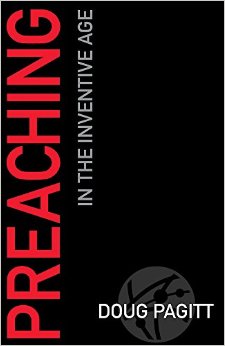 (I’ve just recently re-read Doug Pagitt’s creative book on dialogical “sermons” called Preaching in the Inventive Age which offers a very different take then Keller, but is quite stimulating, audacious as it is. Keller understandably is critical of it and its predecessors such as The Roundtable Pulpit and the work of Lucy Rose.)There are many different perspectives and angles and trends, curious things to ponder and clever new approaches to consider and I learn and am forced to think as I read from various viewpoints. I read old school stuff, lots of mainline/liberal textbooks, and try to dip in to dense tomes of communication theory, not to mention compilations of sermons, from Barbara Brown Taylor’s several collections, to, for instance, Brian Walsh’s powerful, must-read St. John Before Breakfast which are sermons (and liturgies) offered at the University of Toronto’s campus ministry morning Eucharistic service called “Wine Before Breakfast.”
(I’ve just recently re-read Doug Pagitt’s creative book on dialogical “sermons” called Preaching in the Inventive Age which offers a very different take then Keller, but is quite stimulating, audacious as it is. Keller understandably is critical of it and its predecessors such as The Roundtable Pulpit and the work of Lucy Rose.)There are many different perspectives and angles and trends, curious things to ponder and clever new approaches to consider and I learn and am forced to think as I read from various viewpoints. I read old school stuff, lots of mainline/liberal textbooks, and try to dip in to dense tomes of communication theory, not to mention compilations of sermons, from Barbara Brown Taylor’s several collections, to, for instance, Brian Walsh’s powerful, must-read St. John Before Breakfast which are sermons (and liturgies) offered at the University of Toronto’s campus ministry morning Eucharistic service called “Wine Before Breakfast.” 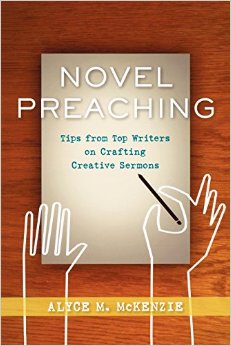
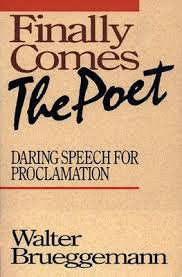 Of course, Walt Brueggemann has several collections of sermons, and several books about preaching — Finally Comes the Poet: Daring Speech for Proclamation may be his most popular — and they are well worth reading. We stock some interesting, practical ones such as Alyce McKenzie’s Novel Preaching: Tips from Top Writers on Crafting Creative Sermons. I really enjoy reading these kinds of resources — even though I most create talks and essays and the lessons for a small Sunday school class I sometimes teach.
Of course, Walt Brueggemann has several collections of sermons, and several books about preaching — Finally Comes the Poet: Daring Speech for Proclamation may be his most popular — and they are well worth reading. We stock some interesting, practical ones such as Alyce McKenzie’s Novel Preaching: Tips from Top Writers on Crafting Creative Sermons. I really enjoy reading these kinds of resources — even though I most create talks and essays and the lessons for a small Sunday school class I sometimes teach.
For what it is worth, Keller interacts with ancient, historical sources more than with more recent ones (and does so well, showing the preaching insights of Calvin or Melancthon, Stibbs, Whitefield, Edwards or Lloyd-Jones without too much of the contemporary ecumenical literature about homiletics, although he does a bit. Those familiar with David Buttrick or Fred Craddock or Eugene Lowry with be fascinated with his observations about mainline denominational approaches these days… as you might guess, he cites Thomas G. Long and his important volume The Witness of Preaching.
The bibliographic suggestions, citations, and endnotes in this book could provide a lifetime’s worth of study, and, for those called to this work, is, again, worth the price of the book itself. Wow –I can’t wait to more carefully work through these many suggestions and recommendations from Keller.
 And, speaking of recommending resources — I keep talking about the wonderful Reading for Preaching: The Preacher in Conversation with Storytellers, Biographers, Poets, and Journalists by Cornelius Plantinga, Jr. anywhere there are preachers or teachers who allow me to say so as it is such a splendid, important, lovely, lovely book. Oh my, how I wish folks would take it to heart. I wish Keller would have cited it!
And, speaking of recommending resources — I keep talking about the wonderful Reading for Preaching: The Preacher in Conversation with Storytellers, Biographers, Poets, and Journalists by Cornelius Plantinga, Jr. anywhere there are preachers or teachers who allow me to say so as it is such a splendid, important, lovely, lovely book. Oh my, how I wish folks would take it to heart. I wish Keller would have cited it!
Since talking about faith — and teaching and preaching — is central to our gathered Christian communities, it strikes me as odd that we don’t sell more of these kinds of books. Heck, I am not ordained to the pulpit ministries, but find these books fabulously interesting and often quite useful. That preachers and teachers and ministry leaders don’t buy them much is just baffling.
Whether you regularly read this genre or not, why not pick up this one by Tim Keller? Give it a try and see if you don’t enjoy a sustained study of the power of the Word and the call to teach and share the gospel in effective ways. No matter your own calling or role, I bet you’ll learn a lot and be a better communicator and a more astute listener of sermons and Bible lessons, too.
And, of course, if you are a teacher or preacher, I really hope you consider this brief but potent work. It will be a good companion for you, I’m sure. Send us an order today.

BookNotes
DISCOUNT
ANY ITEM MENTIONED
20% off
order here
takes you to the secure Hearts & Minds order form page
just tell us what you want
inquire here
if you have questions or need more information
just ask us what you want to know
Hearts & Minds 234 East Main Street Dallastown, PA 17313 717-246-3333

